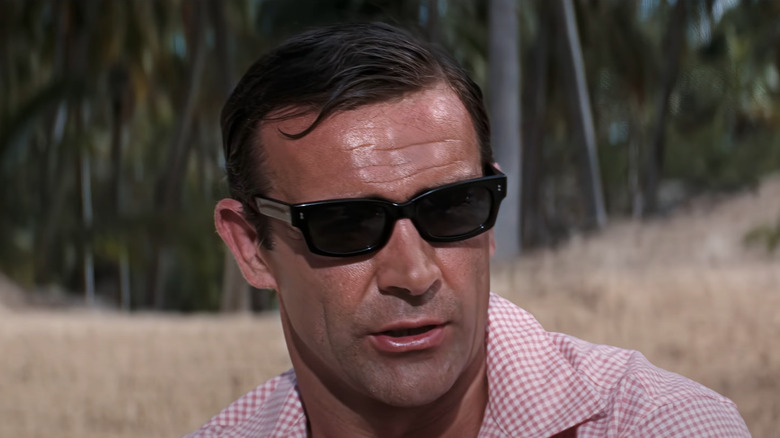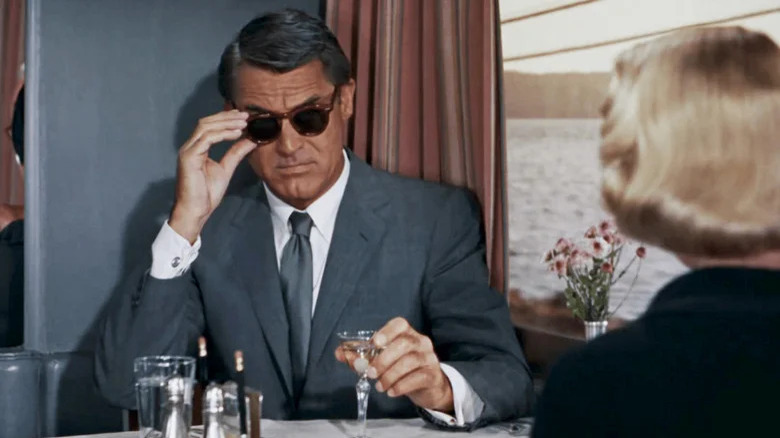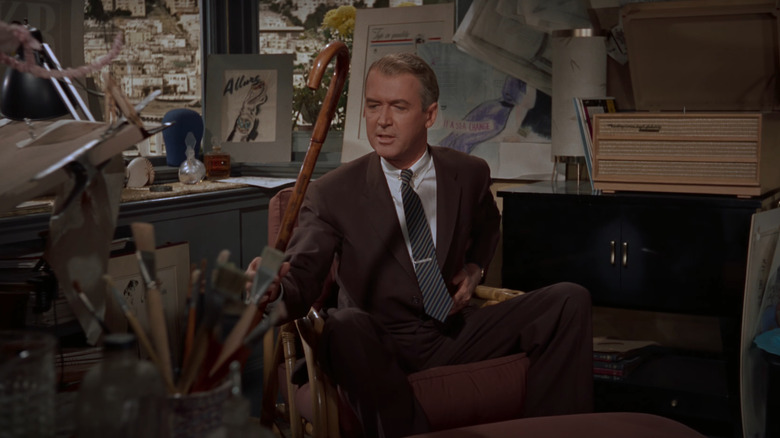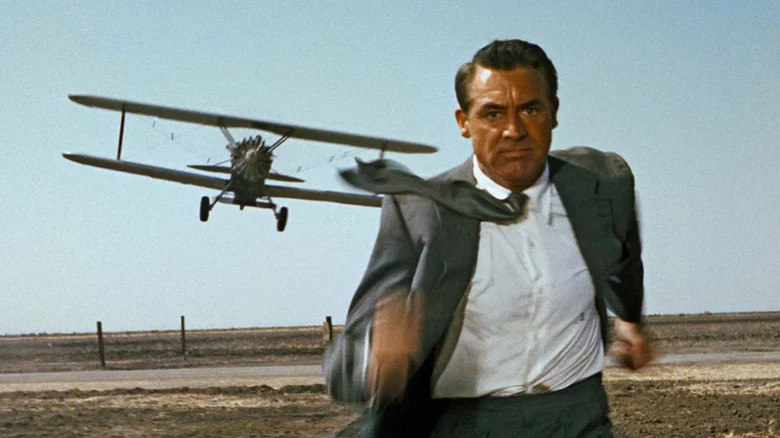The Alfred Hitchcock James Bond Film That Never Came To Be
The James Bond saga is about as well-established a film franchise as you can get. But somewhere, there's an alternate timeline in which the first ever Bond movie was directed by Alfred Hitchcock.
Today, there's a lot of discussion surrounding whether or not Christopher Nolan will finally be given a crack the secret agent. Nolan certainly seems up for directing a 007 entry, and has been for quite some time. With the Daniel Craig era drawing to a divisive close in "No Time To Die," there's every chance the revered British filmmaker could bring his cerebral approach to the next Bond outing. Of course, that would require producers Barbara Broccoli and Michael G. Wilson allowing him the complete creative control he demands.
But this isn't the first time a highly-regarded British director with a penchant for meticulous oversight has been touted as the ideal filmmaker to take on England's greatest spy. Hitchcock was, at one time, very much in the running to not only direct a Bond movie, but to bring Bond to the big screen for the first time. His spy classic "North by Northwest" debuted in 1959, which some argue was the prototypical Bond movie. The film's star, Cary Grant, even turned down playing Bond before Sean Connery got the job. Unsurprisingly, Bond author Ian Fleming certainly saw the merit of bringing the director onboard for his MI6 character's cinematic debut. But it would be Terrence Young who eventually directed 1962's "Dr. No," imbuing Bond with many of the trademarks we've come to expect from his adventures. So what happened to Hitch's take on Bond?
The other Thunderball
Before "Dr. No" arrived and kicked off cinema's most enduring franchise, the plan was to make a version of "Thunderball" that would introduce movie-goers to James Bond. This version of what would ultimately become the fourth 007 movie was based on a script by Ian Fleming and his collaborators Kevin McClory and Jack Whittingham. Unlike "Dr. No," which adapted the sixth Bond book, the original "Thunderball" screenplay wasn't based on a novel. Instead, it was an attempt by the authors to write an adventure specifically for the screen.
Ultimately, the script would be reworked by Fleming to become the ninth Bond novel, prompting a legal dispute between the author, McClory, and Whittingham. But before that debacle played out, Fleming seemingly had plans to get Alfred Hitchcock onboard to bring the original "Thunderball" script to fruition. As Chris Wright, co-host of the "James Bond Radio" podcast, told Variety, "It was Ian Fleming's idea to contact Hitchcock. He sent a telegram to Hitchcock through a mutual friend, asking if he'd be interested in directing Bond's movie debut."
Not only had the director proven he was up to the task with "North by Northwest," he'd also built his career on spy movies, directing such 1930s classics as "The 39 Steps" and "The Lady Vanishes." Bond and Hitch seemed like the perfect pairing. But as we all know, the director never actually got to put his stamp on 007.
Jimmy Stewart as Bond?
Edward Gross and Mark A. Altman's book "Nobody Does it Better" is an exhaustive history of the James Bond movies, and draws on comments from an array of Alfred Hitchcock scholars to convey how close the director came to taking on Bond.
As Robert Sellers, author of "The Battle for Bond," recounts, Kevin McClory was expecting to direct the original version of "Thunderball" — entitled "James Bond of the Secret Service" — which he'd helped write. But when his film "The Boy and the Bridge," proved a flop, Ian Fleming started to "have second thoughts that McClory wasn't a capable director." James Chapman, author of "Hitchcock and the Spy Film," claims Hitchcock was then "sounded out" as a possible replacement for McClory, but that his taking on the film was "more an idea rather than a concrete initiative."
But for Ian Fleming, it certainly seemed like a concrete initiative, with Sellers remarking that, "Hitchcock was actually interested for quite a few months. He was hemming and hawing, and there are lots of letters to and fro." Interestingly enough, according to Sellers, one of these letters revealed that Hitch was intending to cast his longtime collaborator James Stewart as 007, to which Fleming responded, "It wouldn't be so bad if he loses the accent."
Sellers also reiterates the producers' fears over Hitchcock's trademark creative control. The filmmaker was known for his exacting control of productions, and with Bond, he would no doubt require similar creative freedom. Sound familiar? Ultimately, Hitch was reportedly reticent to take on another spy thriller following "North by Northwest," which is why his Jimmy Stewart-starring Bond movie was never made. Instead, the director focused on 1961's "Psycho," while Fleming and co. found their director in Terrence Young, without whom Bond would likely have failed.
What could have been
Though he never actually directed a James Bond movie, Alfred Hitchcock's influence can still be seen in the franchise, especially in the earlier films, which sometimes made direct references to Hitch's movies. In "From Russia With Love," for instance, Sean Connery's Bond is attacked by a helicopter that flies dangerously low, in what is basically a straightforward homage to the legendary crop duster scene in "North by Northwest," wherein Cary Grant's Roger Thornhill is attacked by a similarly low-flying aircraft.
There's no doubt Hitchcock's Bond movie would have been successful. The director was at the height of his career, and he'd proven he had a considerable talent for doing the spy genre well. But the Bond we know today would look very different if things had played out this way. As James O. Naremore, film scholar and author of "North by Northwest: Alfred Hitchcock, Director," says in the "Nobody Does it Better" book:
"It's hard for me to imagine what Hitchcock would have done with Fleming—Hitchcock's approach to sex was rarely exhibitionistic: no cheesecake. His violence is more disturbing than Fleming's sadism, and his humor isn't Bond-like."
Writer James Stratton, who authored "Hitchcock's North by Northwest: The Man Who Had Too Much," added:
"I don't think Hitchcock and Bond would have been a successful match. Hitchcock was more subtle and more interested in ambiguity. Bond would have been a bit too straightforward and the tight Bond formula would not have allowed for his personal preoccupations."
There's also the question of whether Hitch would have returned for more Bond films after directing the ill-fated original "Thunderball." Given the director's filmography and its lack of sequels, that seems unlikely. Still, it's fun to imagine what the director would have done with 007.



